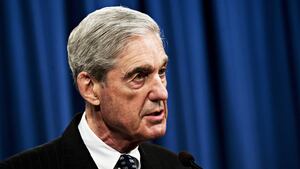The depressing crux of Robert Mueller’s work can be summed up in two words: Nixon won.
In what he clearly hopes will be his last public statement about his investigation, Mueller on Wednesday stressed how Department of Justice policy meant that a president “cannot be charged with a federal crime while he is in office.”
He went on: “Even if the charge is kept under seal and hidden from public view, that, too, is prohibited… Charging the president with a crime was therefore not an option we could consider.”
That left only two outcomes: either clear the president of any criminality or “punt the football” to Congress and make it a political, rather than a legal, process.
Mueller also stressed in his report and again in his statement that if his office “had confidence that the president clearly did not commit a crime, we would have said so.”
Therefore, Mueller could either say that the president “was not a criminal” or that he “wasn’t not a criminal.” Mueller did the latter. Let’s pause and consider how absurd these restrictions are.
For example, during his presidential campaign, Trump joked that he could shoot a person “in the middle of Fifth Avenue” and not lose supporters. If Trump had really gone and done that after the election all a prosecutor could do would be to advise Congress that Trump hadn’t not shot someone.
The Justice Department policy that we now know turned Mueller’s investigation into a farce even before it began stems from an advisory memorandum crafted by Richard Milhous Nixon’s White House Office of Legal Counsel (OLC).
In the fall of 1973, a year after the Watergate break-in and a year before Nixon resigned, the OLC submitted an advisory memorandum to the DOJ that argued it would be unconstitutional to charge a sitting president with a crime, because the ensuing criminal proceedings would “undermine the capacity of the executive branch to perform its constitutionally assigned functions.”
Therefore, the president needs to be able to commit crimes because American laws, should not impede the executive’s ability to carry out existing laws. This “logic” is twisted even before considering the memo’s context and timing.
In 1973, the walls were closing in on Nixon and his people. Nixon’s vice president, Spiro Agnew, was under a criminal investigation regarding non-Watergate corruption charges, too. Also, Nixon’s first attorney general, John Mitchell, who’d resigned in 1972 to help run the reelection campaign, in which role he helped orchestrate the Watergate break-in, was under investigation. Mitchell even went so far as to lock his wife, Martha, in a hotel room in California and forcefully sedate her for days to prevent her from talking about the break-in to the press. In 1975, Mitchell was found guilty and sentenced to two-and-a-half years in prison. Agnew eventually resigned so as to avoid jail time.
More, the Justice Department was in a state of chaos. From Mitchell’s resignation in March of 1972 to the end of 1973, less than two years, there were four attorneys general: Richard Kleindienst, Elliot Richardson, Robert Bork, and William Saxbe.
To make matters even worse, the OLC’s advisory memo was submitted to the DOJ less than a month before the Saturday Night Massacre, which resulted in AG Richardson resigning and Bork becoming the acting AG. It is still unclear which AG agreed to make this memo DOJ policy, but it is clear that Bork contributed to the creation of the OLC’s memo while he served as solicitor general prior to being named acting attorney general.
As we know Nixon avoided prosecution during his presidency, resigned on August 9, 1974, to avoid impeachment, and a month later, on September 8, President Gerald Ford pardoned Nixon for any and all crimes related to Watergate.
This DOJ policy comes from a White House cabal filled with criminals trying to avoid prosecution and a DOJ in utter turmoil, without a clear leader, and heavily influenced by the OLC. This horrendous bad faith policy guided Mueller’s investigation, and also set a standard of making the president only accountable to the winds of politics and above the law.
Since taking office, Trump has always considered himself to be a president-king who exists above the law, and Nixon laid the foundation for his authoritarian ambitions.
From the beginning of his campaign Trump—following the path laid out by Nixon—aspired to have his popularity and thirst for power prevail over established democratic standards and principles, and the limitations of the Mueller report vindicate that plan.
Trump spent many millions and avoided taxes by committing crimes. He won the White House by committing crimes. He tried to silence Mueller’s investigation by committing crimes. And he’ll try to win re-election by committing crimes—just like Nixon did in 1972 with Watergate.
Because of DOJ policy, he knows that his crimes are now, at worst, merely “not legal” actions that Congress must address if they choose to do so—and we know the GOP probably won’t.
In 1977, Nixon famously looked back to say, “When the President does it, that means that it’s not illegal.”
Today, we are finding out the hard way what he meant.







